Holidays
| Website: | Herzlich willkommen auf der Seite der QUA-LiS NRW |
| Kurs: | [Q23] Celebrations |
| Buch: | Holidays |
| Gedruckt von: | Gast |
| Datum: | Freitag, 27. Februar 2026 |
Beschreibung
1. Vocabulary list - Holidays
| Picture | English | German | In context | Notes |
|---|---|---|---|---|
| Christmas |
Weihnachten (das Weihnachtsfest) | At Christmas the family celebrates together. | Write something that helps you to learn. |
|
| Eid al-Fitr (Sugar Feast) |
das Zuckerfest | Eid al-Fitr is the end of Ramadan. | ||
| Chanukka |
Chanukka (das Chanukka-Fest) | Chanukka is an important holiday for Jews. | ||
| Holi |
Holi (das Holi-Fest) | Holi is the festival of colours. | ||
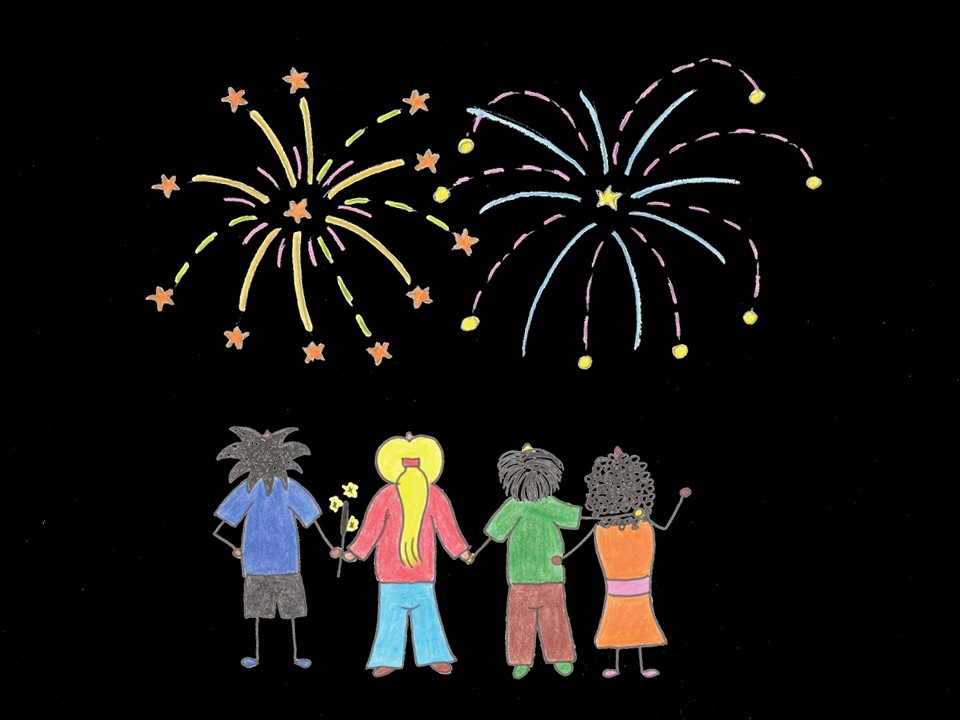 |
New Year's Eve |
Silvester | On New Year's Eve we light firework. | |
 |
Easter |
Ostern | On Easter we paint eggs. | |
 |
Halloween |
Halloween | On Halloween people dress up in costumes. |
| Picture | English | German | in context | notes |
|---|---|---|---|---|
| to celebrate |
feiern | We celebrate Christmas in December. | Write something that helps you to learn. |
|
| bank holiday |
gesetzlicher Feiertag | On a bank holiday shops are closed. | ||
 |
Christian |
christlich | Christians celebrate Christmas. | |
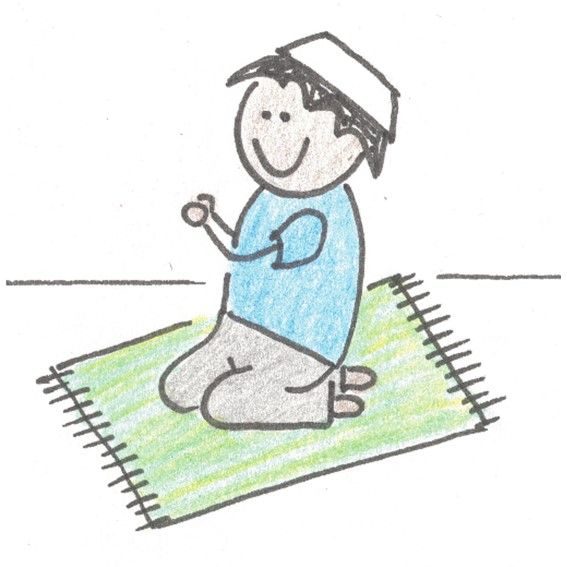 |
Muslim |
muslimisch | Muslim people celebrate Eid al-Fitr. | |
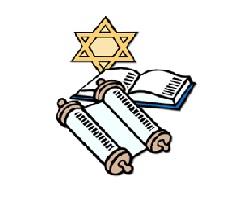 |
Jewish |
jüdisch | Jewish people celebrate Chanukka. | |
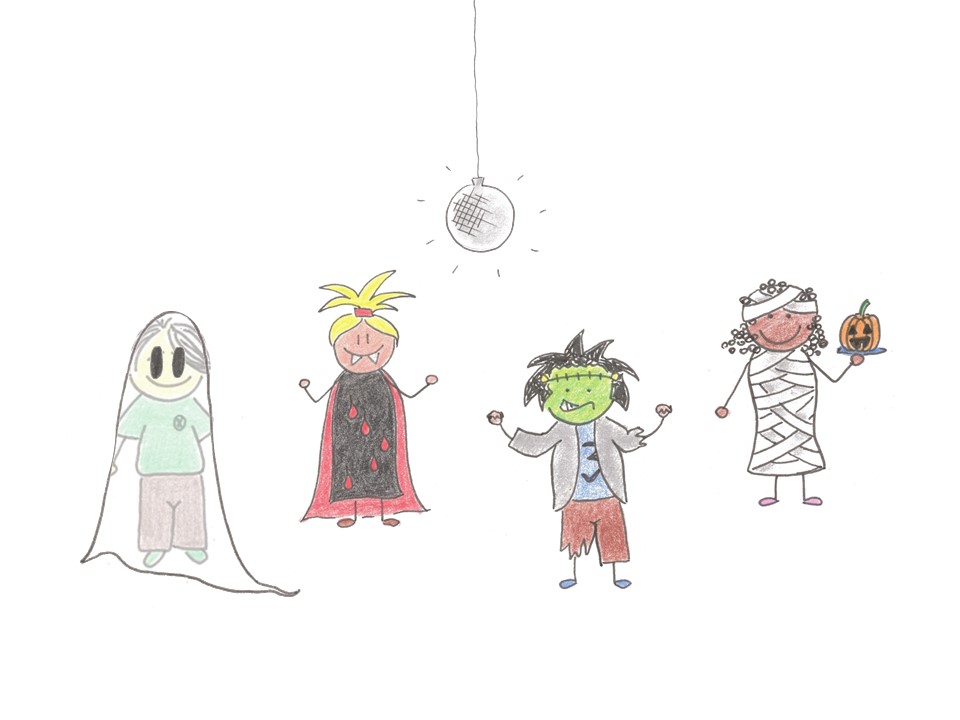 |
costume |
(das) Kostüm | You wear a scary costume on Halloween. | |
 |
vampire |
(der) Vampir | A vampire drinks blood. | |
 |
ghost |
(der) Geist | A ghost is white and scary. | |
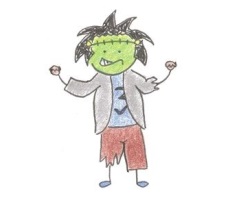 |
zombie |
(der) Zombie | A zombie never dies. | |
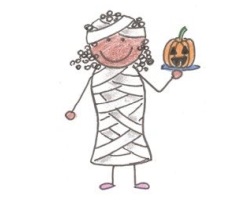 |
mummy |
(die) Mumie | A mummy is very old. |
1.1. Dialogue cards
1.2. Flashcards
1.3. Memory
learningapps.org: Cookies
1.4. Paraphrasing (optional)
Paraphrase* three words from this lesson in the dictionary.
Follow these steps:
Step 1: Read two or three entries in the dictionary as an example.
Step 2: Find words that belong to the topic and that are not yet in the dictionary.
Step 3: Create a new entry in the dictionary in the category "At home".
Step 4: Write the word and its German translation in the title.
Step 5: Paraphrase* the word in the dictionary.
Step 6: Write an example sentence with the word.
Extra-Step (creative): If you want, you can add a picture to your entry. You can draw something or take a picture.
Watch the tutorial if you need help.
* "Paraphrasing" means that you explain the vocabulary in your own words for someone who doesn't know it, e.g. "A sneaker is a shoe that you wear for sports."
Erkläre drei Wörter aus dieser Lektion für das "dictionary".
Führe folgende Schritte aus:
Schritt 1: Lies zwei oder drei Einträge im "dictionary" als Beispiel.
Schritt 2: Finde Wörter, die zum Thema gehören, aber noch nicht im "dictionary" stehen.
Schritt 3: Erstelle einen neuen Eintrag für die Kategorie "At home".
Schritt 4: Schreibe das englische Wort und die deutsche Übersetzung in den Titel.
Schritt 5: Erkläre das Wort im "dictionary".
Schritt 6: Schreibe einen Beispielsatz mit dem Wort.
Extra-Schritt (kreativ): Wenn du möchtest, kannst du ein Bild ergänzen. Du kannst etwas zeichnen oder ein Foto machen.
Schau dir das Tutorial an, wenn du Hilfe benötigst.
2. Vocabulary list - Seasons and months
| Picture | English | German | In context |
Notes |
 |
season |
(die) Jahreszeit | There are four seasons in a year. | Write something that helps you to learn. |
| spring |
(der) Frühling | In spring it gets warmer and flowers grow. | ||
| summer |
(der) Sommer | In summer it is often hot. | ||
| autumn |
(der) Herbst | In autumn the leaves fall from trees. | ||
 |
winter |
(der) Winter | In winter it is cold. |
| Picture | English | German | In context |
Notes |
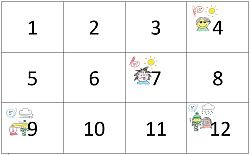 |
month |
(der) Monat | A year has twelve months. | Write something that helps you to learn. |
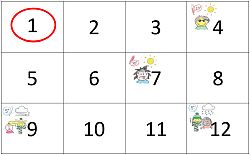 |
January |
(der) Januar | In January we celebrate New Year's Day. | |
 |
February |
(der) Februar | February is the shortest month. | |
 |
March |
(der) März | In March it gets warmer. | |

|
April |
(der) April | In April we celebrate Easter. | |
 |
May |
(der) Mai | May is the fifth month of the year. | |
 |
June |
(der) Juni | In June summer begins. | |
 |
July |
(der) Juli | In July we can go swimming in the sea. | |
 |
August |
(der) August | In August there are holidays in school. | |
 |
September |
(der) September | In September autumn begins. | |
 |
October |
(der) Oktober | Halloween is in October. | |
 |
November |
(der) November | In November the weather is often cold and wet. | |
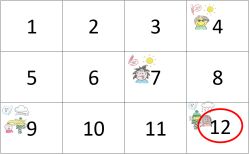 |
December |
(der) Dezember | We celebrate Christmas in December. |
2.1. Dialogue cards
2.2. Flashcards
2.3. Sorting - Months
learningapps.org: Cookies
2.4. Write the month - Holidays around the year.
Some holidays are always celebrated in the same month, some are celebrated on different dates. Find out when the holidays were celebrated in the year 2021.
Manche Feiertage werden immer im selben Monat gefeiert, bei manchen ändert sich das Datum. Finde heraus, wann die Feiertage im Jahr 2021 gefeiert wurden.
| Jan 01 | New Year's Day | Jul 19 | Eid al-Adha | |
|---|---|---|---|---|
| Feb 14 | Valentine's Day | Sep 15 | Yom Kippur | |
| Mar 28 | Holi | Oct 31 | Halloween | |
| Apr 02 | Good Friday | Nov 04 | Diwali | |
| Apr 04 | Easter Sunday | Nov 25 | Thanksgiving Day | |
| Apr 05 | Easter Mondy | Nov 28 | Chanukka | |
| Apr 12 | Ramadan begins | Dec 24 | Christmas Eve | |
| May 09 | Mother's Day | Dec 25 | Christmas Day | |
| May 12 | Eid al-Fitr | Dec 26 | Boxing Day | |
| Jul 04 | Independence Day | Dec 31 | New Year's Eve |
learningapps.org: Cookies
2.5. Teamwork - Holidays around the year
Work with a partner. Talk about the holidays. When did we celebrate them in 2021? When do we celebrate them this year? Can you find out?
Arbeite mit einem Partner oder einer Partnerin. Sprecht über die Feiertage. Wann haben wir sie 2021 gefeiert? Wann feiern wir sie in diesem Jahr? Könnt ihr das herausfinden?
| Jan 01 | New Year's Day | Jul 19 | Eid al-Adha | |
|---|---|---|---|---|
| Feb 14 | Valentine's Day | Sep 15 | Yom Kippur | |
| Mar 28 | Holi | Oct 31 | Halloween | |
| Apr 02 | Good Friday | Nov 04 | Diwali | |
| Apr 04 | Easter Sunday | Nov 25 | Thanksgiving Day | |
| Apr 05 | Easter Mondy | Nov 28 | Chanukka | |
| Apr 12 | Ramadan begins | Dec 24 | Christmas Eve | |
| May 09 | Mother's Day | Dec 25 | Christmas Day | |
| May 12 | Eid al-Fitr | Dec 26 | Boxing Day | |
| Jul 04 | Independence Day | Dec 31 | New Year's Eve |
Example:
Partner A: When did we celebrate Chritmas in 2021?
Partner B: We celebrated Christmas in December.
When do we celebrate it this year?
Partner A: We celebrate it in December, too.
3. Reading - Holidays in Great Britain and the USA
3.1. Listen and read - easy version
Listen to the text while you read it. After that read it out loud. If you want to you can record it.
Höre dir den Text an, während du ihn liest. Lese ihn danach laut vor. Wenn du möchtest, kannst du den Text aufnehmen.
1. Christian Holidays
Slow version:
Many holidays in Great Britain are from the Christian religion. A very important holiday in Britain is Christmas. British people celebrate Christmas on three days (Christmas Eve, Christmas Day and Boxing Day). The next big Christian holiday is Easter. The Friday before Easter Sunday and Easter Monday is called Good Friday. Thanksgiving is also a Christian holiday. Only some people in Great Britain celebrate Thanksgiving. In the USA, Thanksgiving is the most important holiday of the year for many families.
2. Holidays from other Religions
Slow version:
Many people who live in Great Britain today are not Christians. There are also many Muslims, Hindus or Jews. Muslims celebrate Eid al-Fitr at the end of the month of Ramadan. Another important Muslim holiday is Eid al-Adha. Many Hindu people from India and Pakistan live in Great Britain. They celebrate the Hindu festivals Diwali and Holi. Jewish people celebrate Chanukka and Yom Kippur.
3. Holidays that are not religious
Slow version:
Some holidays are not religious. New Year’s Eve is the last day of the year. New Year's Day is the first day of the new year. In the USA, Halloween is also an important day. It is celebrated in October.
3.2. Multiple Choice
4. Reading * - Holidays in Great Britain and the USA
Mark all the names of the holidays that you find in the text.
Note: Some holidays have two words, like Christmas Day. Mark both words.
Markiere die Namen von Feiertagen, die Du im Text findest.
Achtung: Die Namen von einigen Feiertagen bestehen aus zwei Wörtern wie "Christmas Day". Markiere beide Wörter.
4.1. Listen and read *
Listen to the text while you read it. After that read it out loud. If you want to, you can record it.
Höre dir den Text an, während du ihn liest. Lese ihn danach laut vor. Wenn du möchtest, kannst du den Text aufnehmen.
1. Christian Holidays
Slow version:
In Great Britain we call holidays when all the shops and schools close “bank holidays” (because the banks also close). Many people in Great Britain are Christians and many bank holidays are Christian religious holidays. You probably also know them from Germany.
British people celebrate Christmas on three days, Christmas Eve (the evening of December 24th) Christmas Day on December 25th and Boxing Day on December 26th.
The next big holiday is Easter. There are also three bank holidays for Easter: The Friday before Easter is called Good Friday. Then there are Easter Sunday and Easter Monday. Many people in Great Britain also celebrate Thanksgiving, but it is not a bank holiday. This is different in the USA. Here, Thanksgiving is the most important holiday of the year for many families.
2. Religious Holidays (Other Religions)
Slow version:
Of course, there are also many other religions in Great Britain. Muslims celebrate Eid al-Fitr at the end of the month of Ramadan. Another important Muslim holiday is Eid al-Adha. Because many people from India and Pakistan live in Great Britain, the Hindu festivals Diwali and Holi are also important. Jewish people celebrate Chanukka and Yom Kippur. But at the moment only the Christian holidays are bank holidays in Great Britain.
3. Non-Religious Holidays
Slow version:
There are also some important holidays that are not religious, for example New Year’s Eve on December 31st and New Year on January 1st. In the USA, Halloween is also an important holiday on the 31st of October, and people in Great Britain and Germany also celebrate this day more and more.
4.2. Write the word * - What do we celebrate?
learningapps.org: Cookies
4.3. Sorting * - What do we celebrate?
learningapps.org: Cookies
5. Vocabulary list - Halloween
This vocabulary will help you to understand the text.
Diese Worte helfen dir, den Text zu verstehen.
| English | German | Notes |
|---|---|---|
| autumn |
Herbst | Write or draw something that helps you to learn. |
| to celebrate |
feiern | |
| to believe |
glauben | |
| spirit |
Geist | |
| ghost |
Gespenst | |
| to invite someone |
jemanden einladen | |
| to scare someone off |
jemanden abschrecken / verscheuchen | |
| to attend something |
an etwas teilnehmen | |
| haunted house |
verfluchtes Haus | |
| to carve something |
etwas schnitzen | |
| pumpkin lanterns / jack-o'-lanterns |
Kürbislaternen | |
| scary |
unheimlich | |
| to dress up |
hier: sich verkleiden | |
| sweets |
Süßigkeiten | |
| popular |
beliebt | |
| witch |
Hexe | |
| vampire |
Vampir | |
| skeleton |
Skelett | |
| werewolf, pl. werewolves |
Werwolf, Pl. Werwölfe |
5.1. Reading *
Read the text. You can also listen to the audio file.
Lies den Text. Du kannst dir auch die Audioaufnahme anhören.
Here you can listen to the text:
Slow version:

Halloween is a festival in autumn that is celebrated in many countries around the world.
It is celebrated on 31 October every year. It is also known as All Hallows’ Eve or All Saints’ Eve and has a long tradition.
In the old days, people believed that the spirits of the dead walked the earth at Halloween. Ghosts of family members were invited home and bad spirits were scared off.
Today, many adults attend costume parties, go on ghost tours, visit haunted houses or watch horror films at Halloween.
Traditional Halloween activities for kids include wearing costumes, carving pumpkin lanterns (called jack-o’-lanterns), telling scary stories and playing tricks on people.
Children often dress up in costumes and do trick-or-treating, that means they go from house to house and ask for sweets.
Popular Halloween costumes include witches, vampires, skeletons, werewolves and ghosts.
5.2. Multiple choice
Tick the correct answers. Careful: Sometimes more than one is correct.
Klicke die richtigen Antworten an. Achtung: Manchmal sind mehrere Antworten richtig.
5.3. Puzzle
learningapps.org: Cookies
6. Creative task - Research
You know a little about some festivals and holidays now.
Du weißt jetzt ein wenig über einige Feste und Feiertage.
Choose one of the holidays from this chapter and find out more about it. You can ask your parents, other pupils or search the internet for example. Or is there another important holiday that is missing in this chapter? Then find out more about that one.
Prepare a short talk. Record it or tell your class about that holiday.
Wähle einen der Feiertage aus diesem Kapitel aus und finde mehr über ihn heraus. Du kannst zum Beispiel deine Eltern oder andere Schüler fragen oder im Internet nachschauen. Oder gibt es einen anderen wichtigen Feiertag, der hier fehlt? Dann finde mehr über diesen heraus.
Bereite einen kurzen Vortrag vor. Nimm ihn auf oder berichte deiner Klasse über diesen Feiertag.
7. Writing - Your favourite holiday
Write a text about your favourite holiday in the Celebrations-WIKI or send your text to your teacher. If you like, you can also draw a picture. Try to answer the following questions in your text.
Schreibe im Celebrations-WIKI einen Text über dein Lieblingsfest oder sende deinem Lehrer/ deiner Lehrerin den Text als Email . Wenn du möchtest, kannst du auch ein Bild dazu zeichnen. Versuche in deinem Text die folgenden Fragen zu beantworten.
Questions:
- What is the name of the holiday?
- When do you celebrate it?
- Who do you celebrate it with?
- What do you do on that day?
- What do you eat and drink?
- Why do you like it?